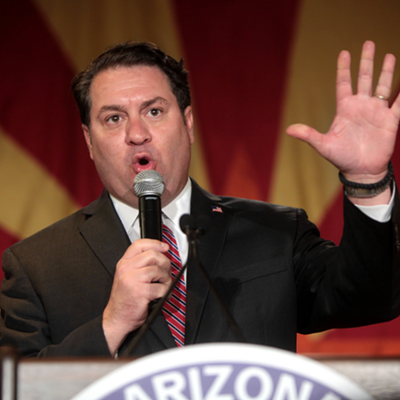Now the on-again, off-again Clean Elections program is up in the air, thanks to decision by the Arizona Court of Appeals eliminating the primary source for public funding for campaigns.
The court ruled that the state could not use a 10 percent surcharge on criminal and civil fines to fund political campaigns of candidates who choose to participate, saying the funding program violated the First Amendment of the U.S. Constitution. Given that at least two-thirds of the money to fund this year's campaigns comes from those charges, there must be plenty of worry among the 140 or so candidates--including all the serious gubernatorial candidates besides Republican Matt Salmon and a whole bunch of other statewide wannabes--who gave up traditional fundraising in favor of collecting the minimum number of $5 contributions to qualify for fat checks from the state to fuel their campaigns.
The court decision came in a lawsuit filed by state Rep. Steve May, a Mesa Republican who took legal action after noticing that $2.70 of a parking ticket was headed for the Clean Elections program. May told the press he felt vindicated--and by the way, he wants his $2.70 back, with interest! Of course, his failure to pay the fine in the first place led to the court case, so May sounds a little confused.
How will the legal twist affect the election? As of press time, the legal wizards are still sorting that question out. The Clean Elections gang hope they'll be able to still dole out the money they have in the bank.
A few candidates--including Democratic gubernatorial candidates Janet Napolitano and Mark Osterloh--have already cashed in on the program. Will they have to cough up a refund? Wait and see.
Supporters of Clean Elections are already preparing their appeal to the state Supreme Court, which could have avoided this whole mess by taking up the matter when first asked to accept jurisdiction. Instead, the justices kicked it down to the Court of Appeals, which has now punted it back upstairs.
CULTURE CLUB: When sophomore Supervisor Ann Day sought to leap from the rising tide of contract scandal at Pima County, the Republican and her handlers scribbled a nifty op-ed piece for the ever-ready Arizona Daily Star. In it, Day lamented the culture of the county that permitted rampant patronage and no financial control.
Day, trying her best to follow Republican Ray Carroll's crusade, forgot her office's ability for success within the county culture. While serving as Day's top aide, George Goebel wired a $35,000 contract for New Jersey-based Jamestown Associates to produce television and radio spots pimping the Sonoran Desert Conservation Plan. Goebel knew about Jamestown's kind of work. He served as an aide to U.S. Rep. Jim Kolbe when Jamestown handled the incumbent Republican's easy run for a ninth term in 2000.
Goebel left his Day job after developing distaste for the county's rollicking, tattletale politics. Taxpayers were giving him $63,500 in annual salary.
Goebel now pilots Jamestown's Tucson office.
Jamestown Web site touts Goebel's new job while misspelling his name.
"I look forward to helping Jamestown grow and shaping the political landscape in the western United States," Goebel says in the publicity piece.
He and the company also brag about the heavy lifting needed to prop Republican Fred Ronstadt to a second City Council term. And he's busy with Kolbe, who needs no help in smashing Democrat Mary Judge Ryan in Congressional District 8.
The Jersey spots on cactus conservation remain shelved, although talk-show gate crasher John Macko is patting himself on the back for getting copies (never a challenge from the open-book style of Pima Prime Minister Chuck Huckelberry) and offering a review on the (Shirley) Scott family AzCorruption.com.
The twisting trail of the county's other sad video production refuses to conclude. Huckelberry, speaking on Emil Franzi's Inside Track radio show Wednesday, said that Ruben Reyes did in fact have an office when he was in a special $22.63-an-hour job to produce a film on youth programs.
Busted by the morning daily for working on Raúl Grijalva's congressional campaign while not doing his county job, Reyes complained that he had no camera, no phone and no office. More than a month after the story broke, Huckelberry now says that the Reyes headquarters was in the Sam Lena Library, the branch in South Tucson that is under the direction of Grijalva's wife, Ramona.
We didn't know that the cash-strapped Tucson-Pima Library system provided office space for budding filmmakers.
Reyes clung to the county payroll after Grijalva jumped from the Board of Supervisors to run for Congress. The no-product, hardly-any work sideshow became so big that Reyes and the county converted his pay from salary into sick leave and vacation pay for his roughly two months as a producer. And he returned $1,590 to the county.
EARTH FIRST! MILLIONS LATER! Lawyers for little Darryl Cherney won a stunning and important federal court victory over the FBI and Oakland Police last with when a jury awarded Cherney and the estate of fellow Earth First! activist Judi Bari $4.4 million for bungled frame-up.
Jurors in the trial in U.S. District Court in Oakland said the FBI must pay $2.4 million and Oakland has to cough up $2 million to Cherney and Bari's estate.
Justice was delayed 12 years.
Bari and Cherney were driving through Oakland on a spring morning in 1990 on their way to an organizing meeting when a bomb exploded in Bari's Subaru. The blast crushed Bari's pelvis and bones in her lower back and rendered the balladeer Cherney temporarily deaf. Police and FBI were on the scene in record time and, also in record time, arrested the two on a variety of trumped-up charges that they were transporting explosives and embarking on all sorts of evil to protect redwood forests and other objects of environmental calamity. Still bloody, dazed and injured, the two were arrested within two hours of the blast. There was no interest from FBI and Oakland Police to find those who tried to kill Cherney and Bari.
Bari died of breast cancer in 1997.
Cherney and Bari were not without their detractors in the internecine environmental movement, but this is an important victory over yet more FBI abuse.
Readers of the Arizona Daily Star got a brief report of the verdict, but no one at the Star remembered how Cherney showed up in Tucson to fight his longtime nemesis Charlie Hurwitz. Cherney popped into Tucson to fight MAXXAM-Horizon plans for the horrendously bladed and graded Rancho del Lago southeast of Tucson. He sang his "Maxxam on the Horizon" ballad for the Pima County Planning and Zoning Commission when the high desert desecration came up for yet another approval. The developer-owned commission majority squirmed at the little "hippie." Chairman Charlie King didn't know whether to piss or wind his watch, so he pissed on his watch.
Good thing Cherney doesn't try to sing to Pima County boards any more--he would be summarily thrown out by the county's buffoonish chief of security Dick Kohlman. Cherney was right. The county had previously fined Horizon for its illegal grading. The county also successfully sued the speculators for destruction of a section of Pantano Wash that exacerbated flooding in 1983.
Rancho del Lago, an eerie former corporate retreat, was gobbled up by The Estes Co., which got approval from the Board of Supervisors in the late 1990s to finish the job of sprawl with, of course, a garish golf course.







